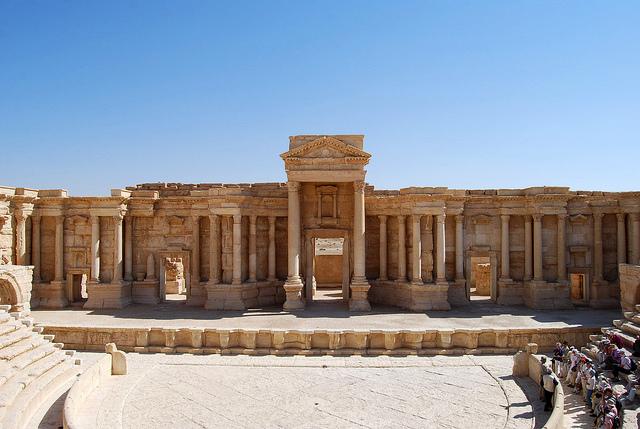
The Associated Press has launched a strong interactive site, Ramadi in Ruins, which allows visitors to chart the devastation of the Iraqi city after it was captured by the Islamic State in May 2015 before being won back earlier this year. In a similar vein, The Atlantic has a great photo essay of modern London streetscapes implanted with historical records to show the damage wrought by Nazi bombing during The Blitz, which ended 75 years ago this week.
China watchers, two useful features have landed recently. First, from The National Interest, is an essay on how China (under President Xi Jinping) sees the world. Second, The New Yorker explores Mao’s Cultural Revolution, fifty years on:
‘China today is in the midst of another political fever, in the form of an anti-corruption crackdown and a harsh stifling of dissenting views. But it should not be mistaken for a replay of the Cultural Revolution. Even with thousands under arrest, the scale of suffering is of a different order, and shorthand comparisons run the risk of relieving the Cultural Revolution of its full horror.’
The longform profile of Obama’s foreign policy communications advisor, Ben Rhodes, presented on this page last week has whipped up quite a frenzy among Beltway wonks, hacks and pundits. Vox has an explainer of the tale so far; over at The Atlantic, Jeffrey Goldberg pokes holes in the profile’s ‘retailing’ of the Iran deal; and this piece from New York magazine lays blame at the feet of both the journalist and his subject.
Fans of US television series The Americans will be spellbound to read the show’s plot come to life in a feature over at The Guardian: ‘The day we discovered our parents were Russian spies’. Highly recommended reading—and if you haven’t seen the show, it’s well worth a binge.
A change of pace comes in the form of this potent piece from the NYRB about Scottish philosopher David Hume, who:
‘…has become something of a hero to academic philosophers. In 2009, he won first place in a large international poll of professors and graduate students who were asked to name the dead thinker with whom they most identified. The runners-up in this peculiar race were Aristotle and Kant. Hume beat them by a comfortable margin. Socrates only just made the top twenty.’
The New York Times’ diplomatic correspondent (and one-time Strategist Six subject), Jane Perlez, recently profiled Admiral Harry B. Harris Jr., Commander of US Pacific Command in Hawaii. Harris has been one of the most outspoken voices in the US military when it comes to Beijing’s actions in the South China Sea, first trying out his ‘great wall of sand’ line at an ASPI dinner last year.
The Warrior Canine Connection was established to help wounded US veterans heal through spending time with service dogs. Luckily for the rest of us, the organisation is aware of the mass-appeal of puppies, and has setup a live-stream nursery camera so that anyone can tune in to watch the new 11-strong litter feed, play and snooze. (Yes, it’s as good as it sounds.)
Podcast
King’s College London recently hosted their annual War Studies lecture, delivered by Professor Jennifer Welsh, Special Adviser to the UN Secretary-General for the Responsibility to Protect. Professor Welsh lectured on The Individualisation of War (1h 16m).
Videos
The Mariinsky Theatre Orchestra of Russia was in Palmyra last week to hold a concert at the site’s second-century Roman amphitheatre. As a piece of diplomacy it was all bum notes, but there’s no denying the spectacular optics. The full performance is available online (54 mins), and here’s a peek into how it all went down.
‘Breaking ISIL’s Brand’ was the focus of the latest Schieffer Series event hosted by DC-based CSIS. The panel comprised of US under secretary of state for public diplomacy and public affairs Richard Stengel, Farah Pandith of the Council on Foreign Relations, and the NYT’s David Sanger (55 mins).
Events
The ANU has this week kicked off an event series that will run all the way up until the 2 July federal election. Panel discussions will be hosted on a range of hot-button election issues, including science and innovation, health, social policy, climate change, tax and security and foreign affairs.